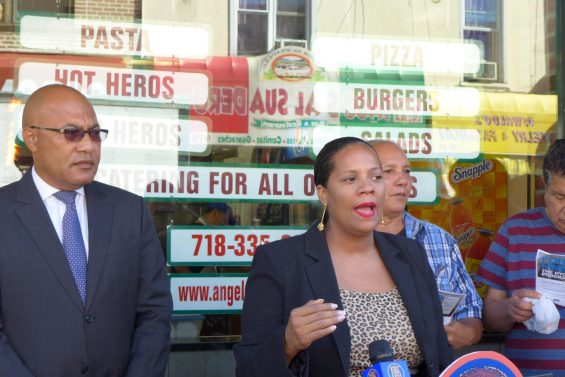
Sept. 13, 2016 By Hannah Wulkan
Individuals and businesses that have racked up penalties on fines they owe have the opportunity to have those penalties forgiven, thanks to a citywide fine forgiveness program launched yesterday with an announcement outside a popular Jackson Heights restaurant.
The city will forgive penalties and interest on violations received by individuals and business owners from the Department of Sanitation, Department of Buildings and other City agencies during a three-month amnesty period, Council Member Julissa Ferreras-Copeland and Finance Department Commissioner Jacques Jiha announced yesterday outside Angelo’s Pizza at 39-03 103rd Street.
The program runs until December 12, and covers unpaid violations that are now in judgment, though it excludes parking tickets, criminal violations, and violations over $25,000.
The program allows an individual or business to pay only the base penalty, as long as it is paid off in full by the end of the amnesty period.
After the amnesty period closes, individuals and businesses must pay all interest and penalties, in addition to their base fines.
“This temporary amnesty program is a win-win for our City, for small businesses, and for property owners,” Ferreras-Copeland said. “It will give New Yorkers a break while helping the City recoup what is owed.”
The last time the city offered any type of similar amnesty period was in 2009, when 7,000 cases were resolved and the city collected $14 million during the three-month period.
“Close to $1.4 million violations have gone into judgment,” said Jiha. “The last time we offered any kind of penalty relief was in 2009, and we believe the time has come to give New York City taxpayers the opportunity and incentive to resolve their debt with the City.”
Some of the most common violations covered by the amnesty period include:
Illegal posting of handbill or notice
Snow, ice or dirt on sidewalk
Improper storage of receptacles
Improper or misused recycling containers
Improper disposal of trash of recyclables
Failure to comply with an order of the Commissioner
Failure to properly place recyclables for collection
Work without a permit
Failure to conduct required inspections and tests
Failure to submit affidavits, design/installation or other documents
Vending merchandise or food in a restricted area





